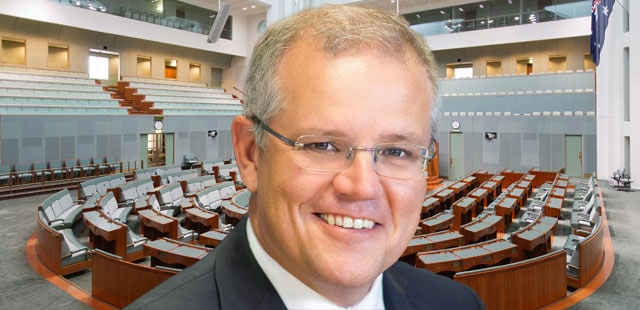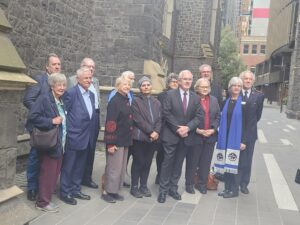Is the PM, a professed Christian, out of step with biblical values?

By George Browning
3 September 2018
Australian Christians have a right to be concerned that the new Prime Minister, on current form, will behave in a way that is out of step with true biblical values, argues Dr George Browning, a former bishop of the Anglican Diocese of Canberra and Goulburn.
On 29 August the comedian Tom Ballard chose to parody the faith of the new Prime Minister, Scott Morrison, on ABC’s Tonightly series by contrasting his perceived lack of love or concern for refugees with his espoused love of Jesus. The ABC has come in for criticism for putting the sketch to air.
However, given that belief shapes values, choices and actions, it is appropriate to examine Mr Morrison’s belief structure, with the reasonable assumption that this will play a part in shaping his social and economic choices. This can be done with some objectivity through the statements of belief issued by the church he attends, and through his own statements about belief and values. If, for example, the church is one of many outlets for the populist “prosperity gospel”, then yes, there are implications for the shape he may want to give to Australian social and economic policy. More on that later.
Mr Morrison is our first Prime Minister to be an active member of a Pentecostal church. Horizon Church is part of Australian Christian Churches (formerly known as Assemblies of God), a movement of more than 1000 Australian Pentecostal churches in voluntary cooperation. Its website states: “Each church is self-governing but commits itself to work together with other churches in the movement for the purpose of mutual support and the spread of the gospel in Australia and the world”. Each of these churches will be shaped by the charisma and giftedness of their pastor. Common to all will be an emphasis on the individual and family life; on renewal through the Holy Spirit of which speaking in tongues is deemed to be an affirming sign; and on God’s desire for each to enjoy health and prosperity.
The Australian Christian Lobby (ACL), which has had considerable influence on conservative politics in Australia, is open to all Christians, but is specifically an arm of the Pentecostal churches. Its emphasis on gender and sexuality are well known. While no assumption can be made as to the extent to which Mr Morrison personally adopts these generic values (he voted against marriage equality), we do know a little of the values that shape Mr Morrison’s life, because he spoke of them in his maiden speech to parliament in 2008:
So what values do I derive from my faith? My answer comes from Jeremiah, chapter 9:24:
… I am the Lord who exercises loving-kindness, justice and righteousness on earth; for I delight in these things, declares the Lord.
From my faith I derive the values of loving-kindness, justice and righteousness, to act with compassion and kindness, acknowledging our common humanity and to consider the welfare of others; to fight for a fair go for everyone to fulfil their human potential and to remove whatever unjust obstacles stand in their way, including diminishing their personal responsibility for their own wellbeing; and to do what is right, to respect the rule of law, the sanctity of human life and the moral integrity of marriage and the family. We must recognise an unchanging and absolute standard of what is good and what is evil. Desmond Tutu put it this way:
… we expect Christians … to be those who stand up for the truth, to stand up for justice, to stand on the side of the poor and the hungry, the homeless and the naked, and when that happens, then Christians will be trustworthy believable witnesses.
Given these are clues to the values that Mr Morrison holds dear, we have the right to be somewhat surprised by the stand, or lack of it, that he has taken on several issues, the first and most obvious being refugees and asylum seekers.
The first statement of belief of the Australian Christian Churches is: We believe that the Bible is God’s Word. It is accurate, authoritative and applicable to our everyday lives. On the matter of “strangers and aliens” the Bible is unequivocally clear – we are to welcome and embrace them. Now of course Australia cannot receive the approximately 68 million displaced people in the world, 25 million of whom are recognised as refugees (approximately 50 per cent of the refugees come from South Sudan, Afghanistan and Syria).
But it is a matter of national shame that we have mistreated so terribly those who have come to our shores. Those still incarcerated on Manus and Nauru are prisoners of a political ideology that has very little to do with the ongoing security of Australian borders. (If the asylum seekers were all released tomorrow, border force has demonstrably shown its capacity to stop people smuggler boats that may then try again to run the gauntlet, notwithstanding the little Vietnamese fishing boat that recently arrived). Given what we know about the unbearable suffering of these people, and given Mr Morrison claims to hold the values that he does (quoting Desmond Tutu), an almost unbridgeable gap is left between the words spoken and the action (or non-action) taken as one of the government’s most influential politicians.
Secondly, he says Christians are expected to stand up for truth. The world is facing climatic change on an unprecedented scale. For three decades we have known the link between human industrial activity, and climate change/global warming. Scientists during this period have not simply given us dire warnings about changes likely to occur in the future, but have given us encouraging information about what can be done to prevent the worst outcomes.
That the Australian government has abjectly failed to produce a policy to address this truth is quite shocking. But to make it worse, those in the energy generating business have made it clear that the high cost of electricity is not related to new forms of generation, but the lack of policy necessary for confident investment. To blame renewable energy sources for the high cost of electricity is shamefully untrue. Until now Mr Morrison has shown no sign that he will support truth in this debate, truth that would simultaneously address cost and emissions.
Thirdly, in using the quote from Desmond Tutu, Mr Morrison nails his colours to the mast of a preferential bias towards the poor and needy. This is of course is the bias of Jesus himself. Is this bias demonstrated in successive budgets over which Mr Morrison has had the responsibility of shaping? It is hard to see it. Pressure to make the Newstart allowance a more liveable safety net has been resisted. Generous provisions made to the already well-off by the Howard/Costello government during the mining boom, like negative gearing, have been left intact. Penalty rates for the poorest paid, particularly in retail and hospitality, have been lost. There is no evidence that the value upon which Mr Morrison claims Christians are to be judged is being implemented in his political decision making.
How then are we to make sense of this apparent credibility gap? Is it that deep down he is a devotee of the “prosperity gospel”? It appears so. This gospel assumes that health and prosperity is a sign of God’s blessing and sickness or poverty a sign of divine disapproval – even punishment. The social and political implication of this gospel is that those who are poor only have themselves to blame: turn to God and your fortunes will turn around. This gospel does not give space for generosity to the poor, for this only encourages their laziness, or lack of personal responsibility. It is important to keep pressure on the poor and unemployed in order that they will sort out the problem which is essentially theirs.
The prosperity gospel also seeks to remove any impediment to personal gain and prosperity. The goal of government is therefore not to regulate for the common good, but for the prosperity of the individual, even to the detriment of common good. The attitude of the conservatives in the present government on environmental issues is evidence enough of this stance.
All Australians should feel obligated to wish Mr Morrison well as our newest Prime Minister. On the other hand he should expect Australian Christians to vocalise their distress if the values he has espoused as a Christian, and which they support, are being ignored – which they appear to be so far.







